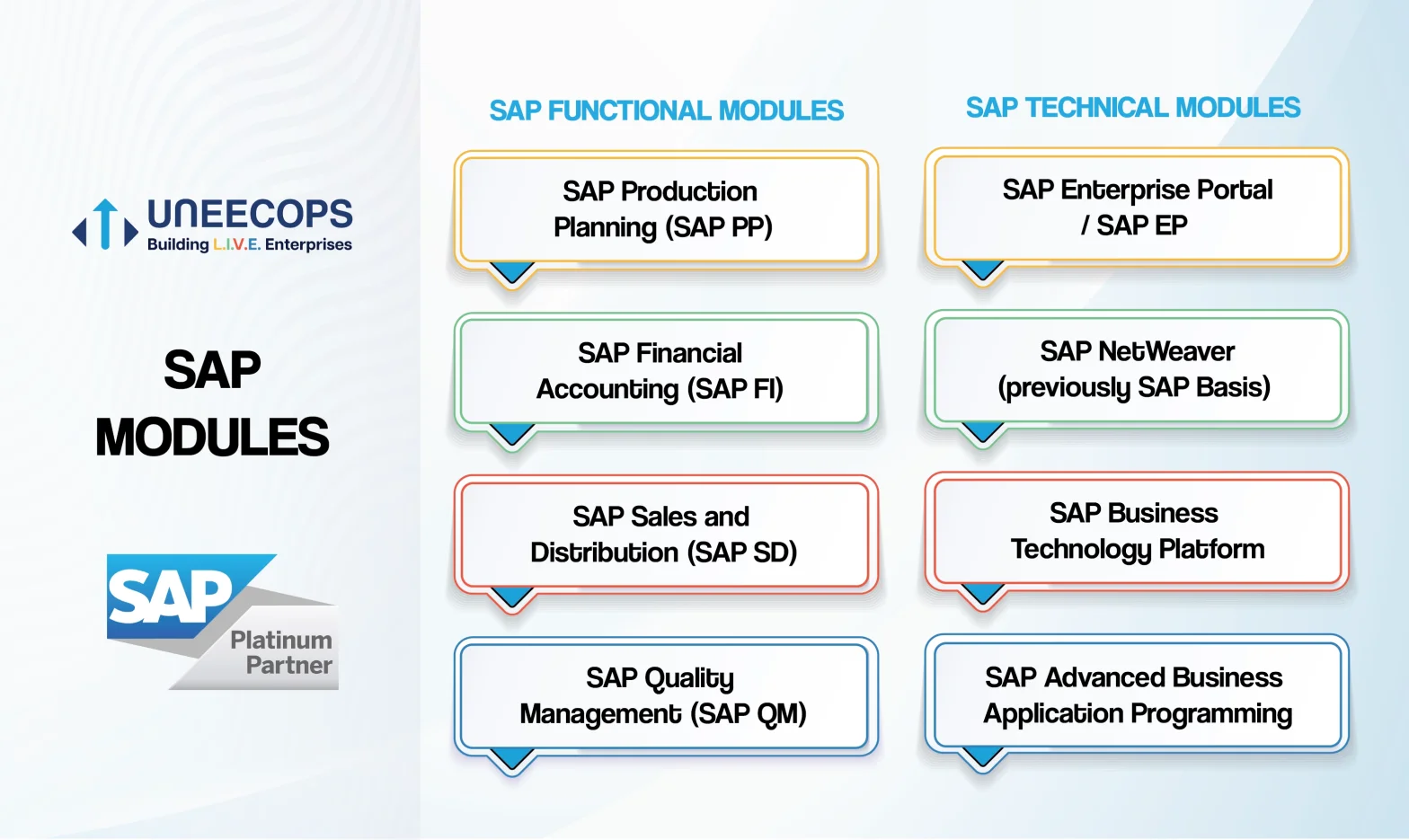What SAP ERP can do for you can amaze you leaps and bounds, and everyone knows they need to go SAP, ASAP. But to digitally transform with SAP software, figuring out how to jump in and make sense of it all is a stumbling block.
This prompts the critical question of who is more likely to catch the SAP wave by successfully deploying the right SAP modules and learning how to use them for upskilling as well as enterprise transformation.
Wherever you are in your buying journey – whether you are confident, fearful, or somewhere in between, this blog can help you understand the key SAP modules. But let us begin with the basics.
What is SAP?
SAP is a German-based globally recognized, preferred and accepted ERP (Enterprise Resource Planning) software company. SAP stands for “System Analysis and Program Development”. SAP’s suite of applications now connects all aspects of enterprise operations, leveraging cloud, AI, ML, automation, and predictive analytics to drive IT modernization across industries.
What are SAP Modules?
SAP modules are specialized components within the SAP ERP system, each focused on a specific business area like finance, procurement, supply chain, or warehousing. They collect and process relevant data, enabling real-time analysis and seamless integration with the central system for informed decision-making.
There are 2 broad categories of SAP modules:
- SAP Functional Modules: These modules focus on covering all day-to-day critical business elements including accounting, HR, quality management, plant maintenance, and material management. They can be used to automate key business processes and remove manual work as well as business silos.
- SAP Technical Modules: These are backend modules used to customize ERP and manage the SAP ecosystem in the company.
Learn More – SAP Business One Modules List 2025
What can SAP modules do for your enterprise? Why learn about SAP modules?
Well, SAP modules are to a business what fingers are to the hand: each one distinct, yet working together seamlessly to drive strength, precision, and control across the enterprise.
Close your fist and you have a power grip. That’s what all modules combined can do for your enterprise – unify all systems and make your organization operate as ONE ENTERPRISE, working towards ONE GOAL.
Let’s understand these ‘fingers’ – the SAP modules designed to support a specific function or department, yet connecting your entire organization into one agile, intelligent system.
A–Z List – All SAP Modules List
Here is a complete A-Z SAP modules list of all its 64 modules:
- SAP Advanced Planning & Optimization (APO)
- SAP Business Intelligence (BI)
- SAP Business Planning and Consolidation (BPC)
- SAP Cash Management (CM)
- SAP Convergent Charging (CC)
- SAP Controlling (CO)
- SAP Customer Relationship Management (CRM)
- SAP Customer Service (CS)
- SAP Data Services (DS)
- SAP Environment, Health, and Safety (EHS)
- SAP Enterprise Asset Management (EAM)
- SAP Event Management (EM)
- SAP Extended Financial Management (EFM)
- SAP Extended Warehouse Management (EWM)
- SAP Flexible Real Estate Management (RE-FX)
- SAP Financial Accounting (FI)
- SAP Funds Management (FM)
- SAP Global Trade Services (GTS)
- SAP Governance, Risk, and Compliance (GRC)
- SAP Human Capital Management (HCM)
- SAP Incentive and Commission Management (ICM)
- SAP Integrated Business Planning (IBP)
- SAP Integrated Product and Process Engineering (IPPE)
- SAP Library (Documentation)
- SAP Master Data Governance (MDG)
- SAP Master Data Governance for Material Data (MDG-M)
- SAP Master Data Governance for Supplier Data (MDG-S)
- SAP Materials Management (MM)
- SAP Multi-Resource Scheduling (MRS)
- SAP NetWeaver
- SAP Oil & Gas
- SAP Plant Maintenance (PM)
- SAP Point of Sale (POS)
- SAP Portfolio and Project Management (PPM)
- SAP Predictive Analytics
- SAP Process Integration (PI)
- SAP Product Lifecycle Management (PLM)
- SAP Production Planning (PP)
- SAP Project System (PS)
- SAP Quality Management (QM)
- SAP Real Estate Management (RE)
- SAP Real-Time Offer Management (RTOM)
- SAP Retail
- SAP S/4HANA Finance (formerly Simple Finance)
- SAP S/4HANA Supply Chain
- SAP Sales and Distribution (SD)
- SAP Service Parts Planning (SPP)
- SAP Solution Manager (SolMan)
- SAP Strategic Enterprise Management (SEM)
- SAP Strategic Enterprise Management – Integrated Planning (SEM-IP)
- SAP Supplier Lifecycle Management (SLC)
- SAP Supplier Relationship Management (SRM)
- SAP Supply Chain Management (SCM)
- SAP Test Data Migration Server (TDMS)
- SAP Time and Attendance Management (TAM)
- SAP Trade Promotion Management (TPM)
- SAP Transportation Management (TM)
- SAP Treasury and Risk Management (TRM)
- SAP Travel Management (TM)
- SAP User Experience (UX)
- SAP Variant Configuration (VC)
- SAP Vehicle Management System (VMS)
- SAP Warehouse Management (WM)
- SAP Xapps (Cross-Applications)
While these are core SAP modules, all these also have their sub-modules. Today, let us discuss some of the most commonly used SAP technical modules, SAP functional modules and SAP new modules.
SAP Functional Modules Explained
What Are SAP Functional Modules?
SAP functional modules enable businesses to automate and streamline their front-shop operations like sales, accounts, supply chain management, inventory optimization, and more. They help manage critical business processes across the company user base – department-wise as well as region-wise.
Main SAP Functional Modules List
- SAP Financial Accounting (SAP FI)
- SAP Production Planning (SAP PP)
- SAP Material Management (SAP MM)
- SAP Controlling (SAP CO)
- SAP Sales and Distribution (SAP SD)
- SAP Financial Supply Chain Management (SAP FSCM)
- SAP Logistics Execution (LE)
- SAP Project System (SAP PS)
- SAP Plant Maintenance (SAP PM)
- SAP Quality Management (SAP QM)
Let us deep dive into these SAP functional modules:
- SAP Financial Accounting (SAP FI) – This module helps enterprises digitally manage all their enterprise financial transactions, from basic accounting to more advanced revenue reports.
Business Aspects/Areas SAP FI modules cover (Sub-modules of SAP FI)
- Centralized general ledger
- Accounts Receivable and Accounts Payable
- Asset accounting
- Bank accounting
- Financial statements and reporting
- Tax accounting and management
- SAP Production Planning (SAP PP) – SAP Production Planning (SAP PP) aids production planning efficacy based on historical master data, sales forecasts and assessment of demand-supply chain. Companies use SAP PP module to strategize their long-term production strategies, covering production schedules, manufacturing orders, raw material procurement, resource optimization and shop floor efficiency. This helps manage goods production, sales, supply chain, and vendors better.
Here are a few sub-modules included in the SAP PP module:
- Sales prediction
- Data and demand management
- Material requirement planning (MRP)
- Production orders
- Capacity planning and leveling
- Bill of materials (BOM)
- Work center management
- Product routing
- Material master data management
- Shop floor control and information systems
- SAP Material Management (SAP MM) – SAP MM streamlines material planning to procurement activities. From supplier relationships to material quality, it helps businesses keep a tab on everything.
A look at the sub-modules of SAP Material Management:
- Consumption-based stock planning
- Purchasing contracts
- Storage planning
- Inventory control
- Invoice verification
- Demand forecasting
- External services management
- SAP Controlling (SAP CO) – SAP Controlling (CO) module helps assess a company’s costs, revenue, resources and internal financial management.
Basic sub-modules of SAP CO:
- Cost and revenue management
- Cost center accounting
- Activity-based accounting
- Profitability analysis
- SAP Sales and Distribution (SAP SD) – This core SAP ERP module automates the end-to-end process of order placement to product/service delivery. It tightly integrates sales, logistics, and invoicing processes with the rest of the SAP modules like FI and PP.
Key Features/ Sub-modules of SAP Sales and Distribution (SAP SD):
- Master data management
- Order placement
- Sales order creation, processing and monitoring
- Inventory and warehouse management
- Billing, invoice and credit management
- Foreign trade tracking
- Delivery and shipping scheduling
- Pricing and discounts management
- SAP Financial Supply Chain Management (FSCM) – This SAP ERP module links the supply chain to financial transactions. It is used by companies to optimize costs and inventory across the financial value chain.
The following are the sub-modules of SAP Financial Supply Chain Management (FSCM):
- Dispute management
- In-house cash
- Credit management
- Cash management
- Risk and treasury management
- Biller direct
- Liquidity management
- Collections management
- SAP Logistics Execution (SAP LE) – This module helps businesses keep a grip over their merchandise management and overlook delivery, transportation, packaging, etc.
The essential sub-modules of SAP Logistics Execution include:
- Warehousing
- Goods shipment
- SAP Project System (SAP PS) – A project management module for handling internal and customer projects, including capital and overhead initiatives. It enables structured planning through work breakdown structures (WBS), activity scheduling, budget allocation, procurement, billing, and progress tracking. SAP PS ensures cost control, timely execution, and transparent reporting across the project lifecycle.
An overview of the top sub-modules of SAP Project System module:
- Project structuring
- Cost and revenue management
- Budget planning
- Time scheduling
- Project confirmation
- Billing
- Project progress tracking
- Reports
- Material and service procurement
- Period end closing
- SAP Plant Maintainence (SAP PM)- The Plant Maintenance module supports organization equipment examination, technical system repair and maintenance management. The ERP module is highly useful for companies looking to reduce equipment breakdown and the huge costs of repairs or replacements.
Commonly used sub-modules of SAP PM:
- Preventive maintenance
- Work clearance
- Plant maintenance projects
- Takeover/handover of technical elements
- Resource allocation and planning
- Standard analyses
- Capacity planning
- Equipment configuration control
- Maintenance requests
- SAP Quality Management (SAP QM) – Various regulated industries and business sectors require organizations to comply with quality control and assurance. SAP QM ensures that products meet quality and compliance standards.
SAP Quality Management sub-modules cover:
- Quality planning
- Quality inspection
- Audit management
- Quality control
- Quality certificates
- Quality notifications
- Test Equipment management
SAP Technical Modules Explained
What Are SAP Technical Modules?
SAP technical modules do not support business processes directly; they provide the underlying tools and infrastructure that are requisite for implementing, administering, integrating, customizing, and maintaining an SAP system.
Main SAP Technical Modules List
- SAP NetWeaver (previously SAP Basis)
- SAP Business Technology Platform (SAP BTP)
- SAP Enterprise Portal/ SAP EP
- SAP Advanced Business Application Programming (SAP ABAP)
- SAP PI (Process Integration)
- SAP Solution Manager
- SAP Application Server
Time to delve deep into these SAP technical modules:
- SAP NetWeaver (previously SAP Basis) – SAP NetWeaver integrates SAP and non-SAP applications and enables them to work together seamlessly. It provides the technology infrastructure for SAP within a unified interface.
- SAP Business Technology Platform/ SAP BTP – A multi-cloud platform that allows users to implement gen-AI level automation within SAP and non-SAP applications.
- SAP Enterprise Portal / SAP EP – This module supports the creation of portals via the responsive and intuitive SAP Fiori. Ideal for large user bases, it supports ABAP and Java systems across diverse landscapes. With role-based access, personalization, and collaboration tools, the portal empowers employees, partners, and customers to focus on the information that drives daily decisions.
- SAP Advanced Business Application Programming / SAP ABAP – SAP’s ABAP enables developers to customize reports, interfaces, and workflows using its native programming language. This helps automate specific business ops requirements and extend SAP’s apps within a cohesive SAP environment.
- SAP Process Integration / SAP PI – It is a central hub for enterprise application integration within the SAP NetWeaver product group. It facilitates the exchange of data between SAP and non-SAP systems, enabling smooth collaboration between diverse internal and external applications.
- SAP Solution Manager – SAP Solution Manager assists with application lifecycle management of your SAP’s infrastructure: on-premise, cloud or hybrid. The highly integrated system supports the end-to-end deployment of all enterprise solutions, including non-SAP software. This helps in business continuity, innovation, and efficient operations.
- SAP Application Server- A primary component of SAP systems, acting as the runtime landscape for business applications. It offers the infrastructure and services for executing business logic, managing user sessions, and interacting with databases and other systems.
Some SAP New Modules
The latest SAP modules focus on the new-age and next-generation of cloud-based solutions and advancements in areas like S/4HANA, supply chain management, and business intelligence. SAP S/4HANA is the latest version of SAP’s ERP system, built on the in-memory HANA database, and offers real-time data processing and analysis. Let us discuss some of the new SAP module releases:
SAP S/4HANA Finance, Logistics, Cloud
As mentioned, SAP S/4HANA is a smart, intelligent and innovative ERP for enterprise digital transformation. As the 2027 deadline to shift away from legacy SAP ECC to SAP S/4HANA is approaching, it becomes even more important for organizations to explore SAP S/4HANA Logistics, SAP S/4HANA Finance, and SAP S/4HANA Cloud implementations.
SAP Integrated Business Planning (SAP IBP)
With supply chain volatility reaching unprecedented levels, SAP Integrated Business Planning (IBP) has emerged as a critical enabler for future-ready enterprises. Designed to enhance demand forecasting, inventory optimization, and real-time supply chain responsiveness, SAP IBP empowers organizations to navigate disruption with agility and confidence. By leveraging AI-powered predictive analytics and cloud-native collaboration, SAP IBP not only drives operational resilience and cost efficiency but also accelerates adaptation to dynamic market shifts. As a result, leading companies across retail, pharmaceuticals, and logistics are rapidly investing in SAP IBP to support and elevate their global supply networks.
SAP Analytics and Reporting & SAP Business Intelligence
Now, SAP has Business Intelligence and Analytics and Reporting modules to help enterprises consolidate their multi-source data and make quicker, AI-driven and real-time decisions. The demand for SAP BI and SAP Analytics and Reporting is increasing in the BFSI, pharma, automotive and manufacturing industries to maximize ROI based on insights.
Beyond new SAP modules, SAP’s constant introduction of cutting-edge features, including SAP S/4HANA cloud, AI-powered analytics, and multi-cloud integrations make it a promising ERP bet for any ambitious organization in 2025.
Read More – SAP S/4HANA Modules List
Conclusion
SAP modules blanket all business processes and are every modern business owner’s ultimate business management toolkit. SAP’s primary strength is offering a one-stop shop for the entire business’s user base, including customers, employees, partners, and stakeholders. Its diverse modules, scalability, easy implementation, centralizing data repositories and advanced real-time analytics empower businesses to succeed in today’s fast-paced landscape and prepare for the competitive environment of tomorrow.
If you are wondering how to get started with SAP modules, you can learn about them via the foundational courses SAP offers. Alternatively, Uneecops can help you with their comprehensive product portfolio, modules, and licenses. We are Asia Pacific Japan’s #1 SAP partner – awarded 7 years in a row and our services are rated 4.9/5 on Gartner Peer Insights. Schedule a free SAP ERP consultation with us to know more.





